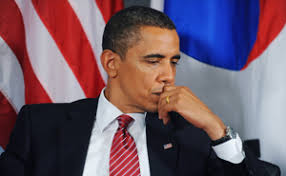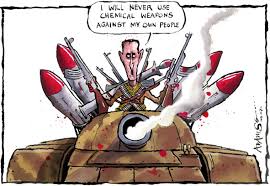Crossing the ‘Red Line’
A
recent Foreign Policy article by
Aaron David Miller describes President Obama’s current Syria dilemma perfectly
– damned if he does, damned if he doesn’t. Recent reports describe that there
is some evidence that Assad has in fact used chemicals weapons on his people.
This, as some may remember, represents a “red line”, that if crossed, would
result in serious US action in Syria. Well, serious thought about action in
Syria. President Obama announced that if the Syrian regime used chemical
weapons on its own people, then he would be forced to change his policy towards
Syria. Now that reports confirm this has indeed happened, President Obama is in
a difficult place. If the US does not act, we may seem weak or encourage
further use of chemical weapons by the regime. If the US does act, there is a
whole list of possible options with an even larger list of possible side
effects, many negative.
 So
what are the US options now that Assad has crossed the red line? Establishing a
no-fly zone is one feasible option. The United States and NATO allies did this
successfully in Libya and it could be done again. The advantages of this would
be to even the playing field and give rebels on the ground relief from Assad’s
air support. This may, however, be more difficult to do than it was in Libya.
Assad’s anti-air batteries would have to be removed either by bombing runs or
by inserting tactical teams to destroy them. We would then have to enforce the
no fly zone with US or NATO air power. To do this we would need a base of
operations that would probably need to be in one of the countries neighboring
Syria or we could launch these attacks from aircraft carriers in the
Mediterranean or the Persian Gulf. Operating out of neighboring state might
prove difficult because many are reluctant to allow US forces to set up shop in
their territory and states like Turkey were not all that cooperative during the
second Gulf War and US forces are currently trying to get out of Iraq. This
makes a no-fly zone in Syria a more complex task than it would seem on the
surface. Another option is to set up safe-zones for civilians but this too
requires eliminating Assad’s air forces with a no-fly zone first and then
enforcing the safe-zones with peacekeepers. Arming the rebels is another option
on the table but given the current divisions within the opposition movement, it
may be difficult to prevent weapons from getting into the hands of some of the
more extremist factions, like al-Nusra, who have links to al Qaeda. A full-scale
military intervention proves even more difficult and could be a political
disaster given the public’s current stance on military intervention after two
unpopular and costly wars in Iraq and Afghanistan.
So
what are the US options now that Assad has crossed the red line? Establishing a
no-fly zone is one feasible option. The United States and NATO allies did this
successfully in Libya and it could be done again. The advantages of this would
be to even the playing field and give rebels on the ground relief from Assad’s
air support. This may, however, be more difficult to do than it was in Libya.
Assad’s anti-air batteries would have to be removed either by bombing runs or
by inserting tactical teams to destroy them. We would then have to enforce the
no fly zone with US or NATO air power. To do this we would need a base of
operations that would probably need to be in one of the countries neighboring
Syria or we could launch these attacks from aircraft carriers in the
Mediterranean or the Persian Gulf. Operating out of neighboring state might
prove difficult because many are reluctant to allow US forces to set up shop in
their territory and states like Turkey were not all that cooperative during the
second Gulf War and US forces are currently trying to get out of Iraq. This
makes a no-fly zone in Syria a more complex task than it would seem on the
surface. Another option is to set up safe-zones for civilians but this too
requires eliminating Assad’s air forces with a no-fly zone first and then
enforcing the safe-zones with peacekeepers. Arming the rebels is another option
on the table but given the current divisions within the opposition movement, it
may be difficult to prevent weapons from getting into the hands of some of the
more extremist factions, like al-Nusra, who have links to al Qaeda. A full-scale
military intervention proves even more difficult and could be a political
disaster given the public’s current stance on military intervention after two
unpopular and costly wars in Iraq and Afghanistan.
 While
these options are all on the table and could possibly manifest within the next
several months, many in Washington are still uncertain whether the US should
rush to intervene in the conflict. In a recent Foreign Policy article by Jeffrey Lewis, the author points out that
there is still not enough evidence that Assad has used chemical weapons to
warrant a US military intervention. Lewis also notes that it is unclear if
whoever comes to power after the regime falls will be any better than Assad,
not because Assad is great, but because the divisions within the opposition
make it entirely likely that an unfriendly government will take power in Syria
post-Assad. Lewis also discusses how there is a great deal of literature that
suggests durable democratic systems rarely thrive after violent conflict with practically
no evidence to suggest that one can “drop democratic processes on a country by
JDAM” (Lewis).
While
these options are all on the table and could possibly manifest within the next
several months, many in Washington are still uncertain whether the US should
rush to intervene in the conflict. In a recent Foreign Policy article by Jeffrey Lewis, the author points out that
there is still not enough evidence that Assad has used chemical weapons to
warrant a US military intervention. Lewis also notes that it is unclear if
whoever comes to power after the regime falls will be any better than Assad,
not because Assad is great, but because the divisions within the opposition
make it entirely likely that an unfriendly government will take power in Syria
post-Assad. Lewis also discusses how there is a great deal of literature that
suggests durable democratic systems rarely thrive after violent conflict with practically
no evidence to suggest that one can “drop democratic processes on a country by
JDAM” (Lewis).

Policymakers
should be hesitant to get involved in a messy civil war because of still shaky
evidence of chemical weapon use. Before the US escalates its Syria policy, we
need more hard evidence. While there is legitimate concern that Assad has or
will use chemical weapons on his people, who’s to say he won’t escalate this if
the US were to escalate their policy. The chemical weapons also represent a dilemma
for the US because if the Assad regime were to fall, these weapons would likely
fall into the wrong hands, namely, terrorist groups who would not be as
hesitant to use them. The US should evaluate the evidence closely and determine
policy from there without rushing into one of the options listed above that
could lead to unintended and negative consequences. The US options above could
very well lead to the fall of Assad and the victory of the opposition but is it
unclear who would take power and what the new government would look like.
Implementing a no-fly zone or any of the other policy options is feasible, but
could result in further escalation of the conflict and may lead to another
state-building mission like we saw in Iraq and Afghanistan. One of the most
important lessons from those cases is that problems facing a country do not end
with the regime. In fact, they may only begin with the fall of the regime and
get worse in the following year. The US should not rush into a military
intervention in Syria without first knowing ALL the facts (see: Iraq). Overall,
Obama’s declaration of the “Red Line” has left some in Washington asking, “What
was he thinking?”
Sources:
I think that Obama's action of declaring a "red line" has been in line with the interests of the United States. If Obama and the rest of the international community allows Assad to use chemical weapons, then this sends a message to other authoritarian leaders that the West will allow for human rights violations. Without a clear red line, authoritarian leaders will do as they please (not that they don't already). Yes, because Obama has declared a red line, now he needs to act since, if he doesn't the authoritarian community will not take future US declarations seriously. I am confident that the US will end up doing something, and that this is still for the greater good despite high costs for the US.
ReplyDeleteI think it was foolish for Obama to make that statement. He delayed acting on the Syria matter for so long that now he can hardly commit the US to aiding the rebels because most of the rebel groups are infiltrated by Islamic extremists. On the other hand, if he doesn't do anything he is signalling the impotence of the United States to the rest of the world.
ReplyDelete